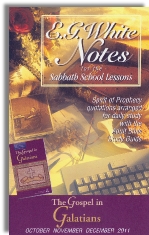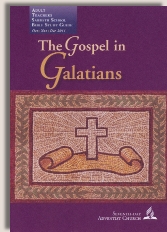|
||||||||||||||
Commentary on "The Gospel and the Church"
Day 4: Tuesday, December 20, 2011 - Burden Bearing
Overview
In today's lesson the author spends the majority of the study discussing the different types of burdens Christians may face as well as the obligation of believers to both carry and share another's burdens. The author states that not allowing others to aid us in our need is a form of human pride and claims that this is what Paul was teaching in verse 3. The author ends the lesson by stating that God's comfort is made manifest through the body of the church and then quotes Evangelical pastor, John Stott to solidify his point.
"God's comfort was not given to Paul through his private prayer and waiting upon the Lord but through the companionship of a friend and through the good news that he brought." John Stott
Observations
The study begins by incorrectly stating that the Greek word for "Burden" in verse 5 is "Baros," which if true would create a contradiction within the passage. This appears to be a typo since tomorrow's quarterly lesson deals correctly with this word. The word used in verse 5 is, "φορτίον" or "phortion", which refers to the personal load of human conscience or responsibility. The Greek word, "Baros", is actually found in verse two. This word describes a burden beyond that which we are personally responsible for. It means a heaviness or trouble. This is the burden that Paul is calling the church to carry for one another.
The author states that in verse three Paul is admonishing believers against an attitude of self-sufficiency that would keep them from allowing others to aid them in their burdens. He states that by not allowing others to carry our burdens we keep them from fulfilling that which God has called them to. There is actually nothing in this section that indicates that Paul is making this point. In fact, Paul is speaking to those who should be doing the helping not to those in need of it. In verse three, Paul admonishes the spiritually proud by stating that if anyone thinks more of himself than he ought he is deceiving himself. In light of the call to help those caught in sin, it would make sense that Paul is expanding on his point that believers must take care to not fall into sin themselves. Paul further admonishes the believers to examine their work so they can take accountability for what is theirs, and carry their own load as the Greek word, "phortion" would indicate.
The final point the author makes is that God's comfort is made manifest through the church and not through personal prayer and waiting on the Lord. While it is true that one of the significant ways God's comfort is manifested to believers is through the body, it is only one way. We find comfort in the peace provided to us through the Holy Spirit, and the promises in the Word of God. We must not only depend on comfort from man. It is far too easy to forgo the word of God to pick up the phone or go online.
"…do not be anxious about anything, but in everything by prayer and supplication with thanksgiving let your requests be made known to God. And the peace of God, which surpasses all understanding, will guard your hearts and your minds in Christ Jesus." Philippians 4:6-8 (emphasis mine)
"Remember your word to your servant, in which you have made me hope. This is my comfort in my affliction, that your promise gives me life." Psalm 119:49-50 (emphasis mine)
"Let your steadfast love comfort me according to your promise to your servant." Psalm 119:76 (emphasis mine)
"So the church throughout all Judea and Galilee and Samaria had peace and was being built up. And walking in the fear of the Lord and in the comfort of the Holy Spirit, it multiplied." Acts 9:31(emphasis mine)
"Now may our Lord Jesus Christ himself, and God our Father, who loved us and gave us eternal comfort and good hope through grace, comfort your hearts and establish them in every good work and word." 2 Thessalonians 2:16-17 (emphasis mine)
As discussed in Monday's commentary we saw that one of the roles of the Holy Spirit in the life of the believer is to comfort the church. It is wrong to imply that praying and waiting on the Lord will not bring comfort to the believer. The Holy Spirit is our comforter:
"But the Comforter, which is the Holy Ghost, whom the Father will send in my name, he shall teach you all things and bring all things to your remembrance, whatsoever I have said unto you." (John 14:26).
A quick survey of the writings of David and it is clear that the manifestation of the Lord's comfort is not limited to human interaction. While this may not be what the author is claiming, it needs to be stated that God brings comfort to His children regardless of the obedience of men. That beings said, we are commanded to fellowship together, love sacrificially, carry one another's burdens, and be built up together in the truth.
Summary
- Believers are called both to carry one another's burdens, and to carry each ones own load.
- A significant role in the life of the believer is to be "present" in fellowship with the body of Christ. Through this process, God does bring comfort to His children.
- Man cannot limit God; His comfort is not only made manifest through people but also through the Holy Spirit and the scriptures. None of these three sources of comfort should be neglected in the life and works of the believer.
Copyright 2011 BibleStudiesForAdventists.com. All rights reserved. Revised December 15, 2011. This website is published by Life Assurance Ministries, Glendale, Arizona, USA, the publisher of Proclamation! Magazine. Contact email: BibleStudiesForAdventists@gmail.com.
The Sabbath School Bible Study Guide and the corresponding E.G. White Notes are published by Pacific Press Publishing Association, which is owned and operated by the Seventh-day Adventist church. The current quarter's editions are pictured above.
Official Adventist Resources
Standard Edition Study Guide Week 13
Teacher's Edition Study Guide Week 13
Easy Reading Edition Study Guide Wk 13
Search the Complete Published Ellen G. White Writings
Please Support This Project


